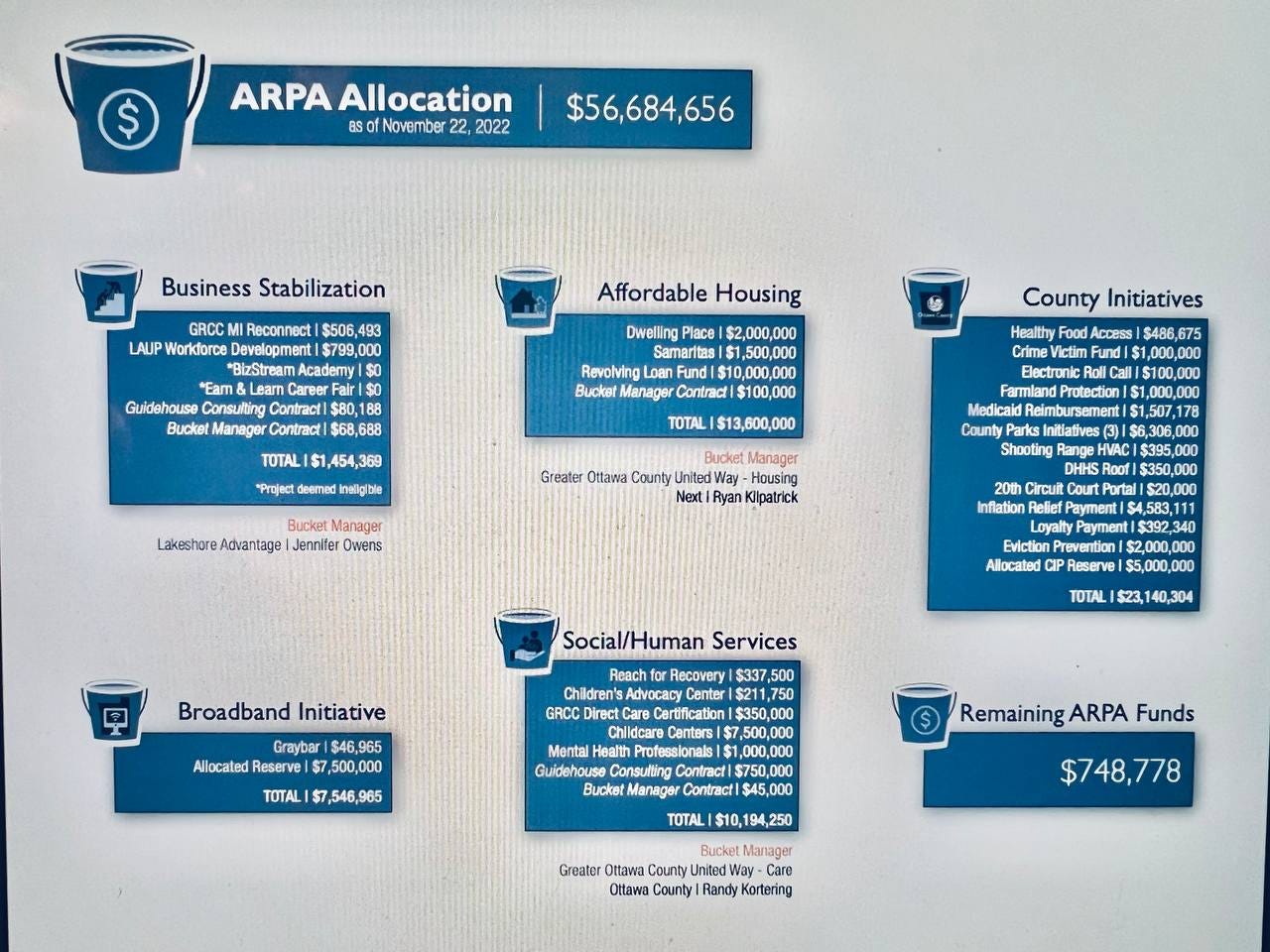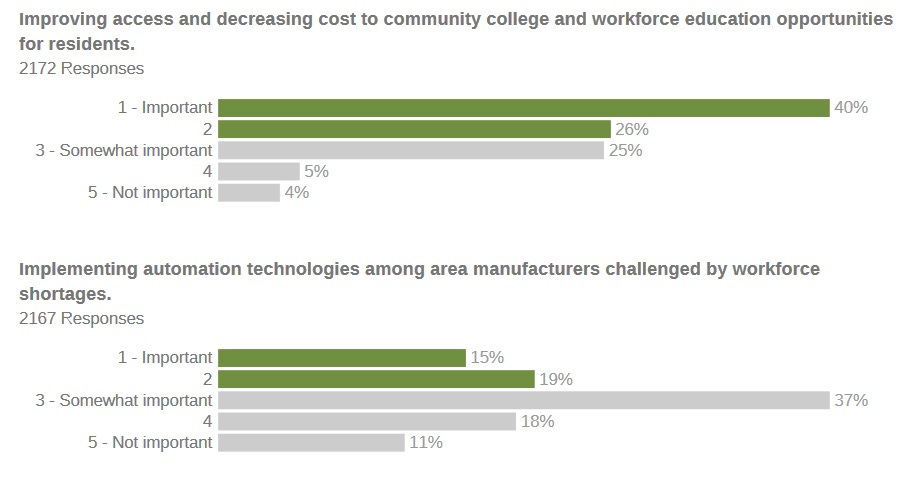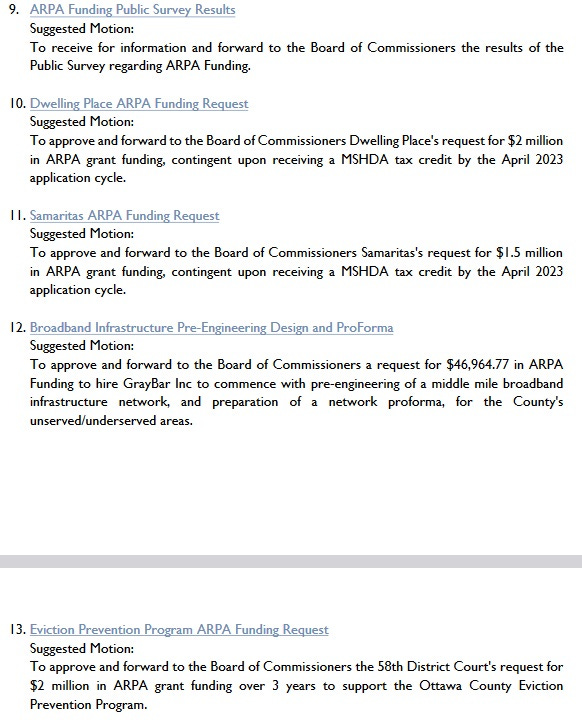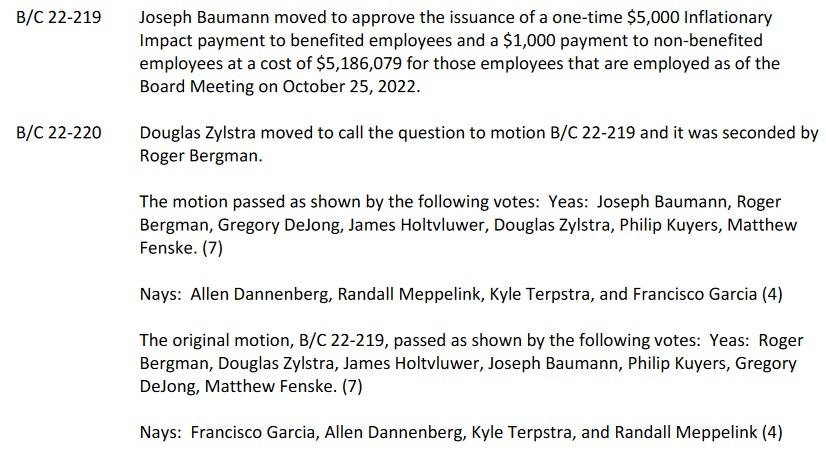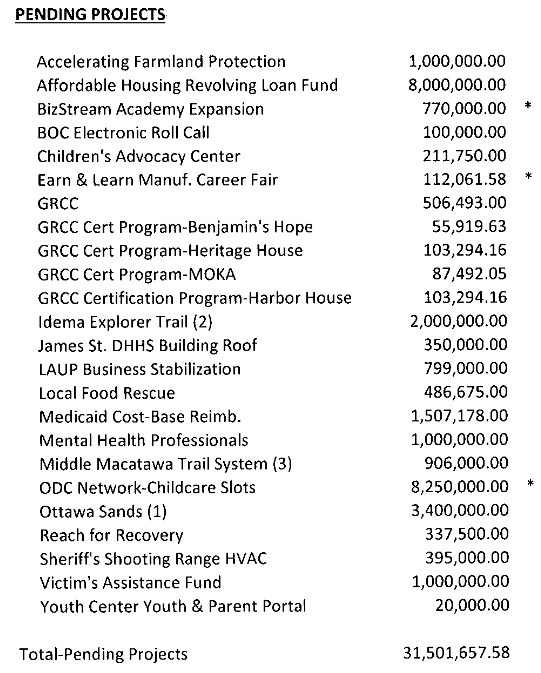In March of 2021, Ottawa County was informed it was receiving $56.6 million in American Rescue Plan Act (ARPA) funding. Although the county had until December 31, 2026, to spend the money, most of it was gone by November 22, 2022. Not many regular citizens know how it was spent. Although the distributions occurred over two years ago, understanding what happened to the ARPA money and how it primarily went to privileged stakeholders who had long standing insider relationships, is helpful to understanding the political climate of Ottawa County.
On February 7th of 2023, during the Finance & Administration Committee meeting (p. 235), the distribution process of the county’s American Rescue Plan Act Funds (ARPA) was discussed. ARPA funding was, “intended to provide an infusion of resources to help communities lay the foundation for a strong and equitable recovery from the COVID-19 pandemic.” According to the US Department of the Treasury, ARPA dollars could be used for four primary purposes.
Support urgent COVID-19 response efforts to continue to decrease spread of the virus and bring the pandemic under control.
Replace lost revenue for eligible state, local, territorial, and tribal governments to strengthen support for vital public services and help retain jobs.
Support immediate economic stabilization for households and businesses.
Address systemic public health and economic challenges that have contributed to the unequal impact of the pandemic.
ARPA guidelines allowed governments to spend grant money on direct services to residents if they could show lost revenue for the calendar years 2020-2023. Ottawa County was able to show a total of $39,712,572 in losses (p.274) and then declared all $57 million to be lost revenue which released the county from complying with Federal rules for spending ARPA money (p.276).
On June 8, 2021, then Administrator Al Vanderberg submitted an Action Request (p.237) to the board of commissioners to set up an ARPA Committee. The action request to form a committee had a pre-selected list of community stakeholders who had already been contacted and “indicated a willingness to serve on an ad-hoc COVID-19 ARPA committee to identify needs in their areas of expertise and assist with developing draft funding priorities for the county board and administration.” The committee included business representatives, government employees, and non-profit leaders whose organizations and affiliates would soon become the primary recipients of the $57 million. It was completely void of any voice from the east side of Ottawa County, and did not include a single person from the general population or small business owner.
Adam Elenbaas - Allendale Charter Township
Gloria Lara - Lakeshore Ethnic Diversity Alliance
Joy Gaasch - Chamber of Commerce Grand Haven
Jennifer Owens - Lakeshore Advantage
Patrick Moran - United Way of Ottawa County of Ottawa
Patrick Cisler - Lakeshore Non-Profit Alliance and Community Spoke
Hadley Streng - Grand Haven Area Community Foundation
Mike Goorhouse - Holland/Zeeland Community Foundation
Terry Nienhuis - Holland Charter Township
Ryan Kilpatrick - Housing Next
Keith Van Beek - City of Holland
Pat McGinnis - City of Grand Haven
Holly Cole - Ottawa County Housing Commission and Grand Haven Area Community Foundation
Dr. Dale Nesbary - Muskegon Community College
Roger Bergman - Chair, Ottawa County Board of Commissioners
Joe Baumann - Chair, Finance & Administration Committee, Ottawa County Board of Commissioners
John Shay - Ottawa County
Karen Karasinki - Ottawa County
Robyn Afrik -DEI Director Ottawa County
Al Vanderberg - Ottawa County
On July 30, 2021, the ARPA Advisory Committee met for the very first time. According to the list of ARPA Committee meeting dates provided on February 7th 2023 during the Finance & Administration Committee meeting, (p. 235) the ARPA committee held fourteen meetings between July 30, 2021, and October 24, 2022, to determine how to divvy up the taxpayer funds. None of these fourteen meetings were open to the general public. Although agendas were provided in the review package, there appears to be few other records from these meetings.
The plan was to assign the $57 million into five categories of spending called “buckets,” which were approved on December 14, 2021. In addition, a manager(s) was to be appointed for each bucket to oversee the selection of projects and distribution of funds. Shockingly, the members of the ARPA Advisory Committee and their colleagues would become the future bucket managers, and be paid to distribute the funds to their own organizations and affiliates.
Five Buckets for ARPA Funds
County Operations
Countywide Broadband
Affordable Housing
Social and Human Service Needs
Business Stabilization Needs
Paul Sachs from the County’s Department of Strategic Impact served as the bucket manager for both the County Operation Initiatives and the Countywide Broadband Initiatives buckets. Bucket managers for the remaining three buckets were selected in the beginning of March 2022. Potential bucket managers were interviewed by a team made up of two members of the ARPA committee and county employees, but no commissioners were involved in the interview process. The ARPA Bucket Manager Interview Team consisted of the following individuals.
Robyn Afrik, ARPA Committee member, and Diversity, Equity, and Inclusion Director
Karen Karasinski, ARPA Committee member, and Fiscal Services Director
Amanda Price, County Treasurer
Paul Sachs, Strategic Impact Director
Amy Bodbyl-Mast, Purchasing Manager
The following individuals and organizations were selected as bucket managers.
Affordable Housing Bucket Managers
Ryan Kilpatrick, ARPA Committee member, and Housing Next Executive Director
Mike Goorhouse, ARPA Committee member, and Community Foundation of Holland/Zeeland president
Hadley Streng, ARPA Committee member, and Grand Haven Area Community Foundation president
Social and Human Services Bucket Managers
Mike Goorhouse ARPA Committee member, and Community Foundation of Holland/Zeeland president
Elizabeth Kidd, Community Foundation of Holland/Zeeland vice president
Hadley Streng, ARPA Committee member, and Grand Haven Area Community Foundation president
Liz DeLaLuz, Greater Ottawa County United Way vice president
Kelly Keen, Greater Ottawa County United Way CFO
Randy Kortering, Greater Ottawa County United Way interim president
Business Stabilization Bucket Manager
Jennifer Owens, ARPA Committee member, and Lakeshore Advantage president
Mandy Cooper, Lakeshore Advantage vice president
Angela Huesman, Lakeshore Advantage COO
According to an email sent by former County Administer John Shay (p.291) to Ottawa County department heads and elected officials on July 12, 2022, “The Committee’s sole purpose is to guide the Board of Commissioners on how to spend the $57 million that the County has received from ARPA.” Not only were these leaders listed above appointed as bucket managers whose sole purpose was to distribute the ARPA dollars, they were paid to distribute the money. As Affordable Housing bucket managers, Ryan Kilpatrick (Housing Next), Mike Goorhouse (CFHZ), and Hadley Streng (GHACF) split a $100,000 contract. As Social and Human Services bucket managers, the team of Mike Goorhouse (CFHZ), Elizabeth Kidd (CFHZ), Hadley Streng (GHACF), Liz DeLaLuz (United Way), Kelly Keen (United Way), and Randy Kortering (United Way) split $45,000. As Business Stabilization bucket managers, the group of Jennifer Owens, Mandy Cooper, and Angela Huesman (Lakeshore Advantage) split $68,688.
A Request for Proposals for ARPA projects (p. 258) was sent out on January 19, 2022. The Ottawa County ARPA Committee created a project application to help them evaluate potential projects based on the “number of individuals that would be served by the initiative, whether the initiative would directly impact historically underserved, marginalized, and/or adversely affected groups, as well as requiring a description of how the initiative would promote equitable outcomes.” They further created the following criteria for project evaluation:
Eligibility requirements established by the Federal Government
Known and demonstrated need
Needed change in societal opportunity and/or eliminates disparities and gaps in opportunities for underserved and underrepresented populations
Project would not otherwise materialize
Opportunity for the project to sustain itself long-term, transformational impact
A description of all submitted project proposals and their proposed bucket categories was included in the board packet on pages 292-350. Ideas included everything from supporting counseling services, constructing bike paths, constructing centers where people could use computers, developing community energy plans, improving roads, handing out gas cards, giving the money back to the government, and giving the money to all county residents in the form of stimulus checks.
Almost one year after the very first meeting in July 2022, the ARPA Committee sent out a survey to obtain feedback from Ottawa County residents. Only 2,233 citizens responded to the survey. The breakdown of the survey results can be found in the packet of the August 16, 2022, Finance & Administration meeting (p.47). The survey included several questions which asked residents to:
“Rank your funding priorities: Affordable Housing, Social/Human Service, Countywide Broadband, Business Stabilization; On a scale of 1 to 5, how important is it to fund projects in the following subcategories?”
Increasing housing stock that meets the financial needs of the local workforce
Increasing housing stability by reducing residential evictions for the local workforce through private-public partnerships
Creating pathways for all residents in need to receive mental health support
Increasing access to affordable child care
Building broadband infrastructure, in collaboration with the private-sector, to connect areas of the County lacking reliable, affordable high-speed internet
Creating digital literacy programs to help residents develop the competencies needed to participate in an expanding digital world
Improving access and decreasing cost to community college and workforce education opportunities for residents
Implementing automation technologies among area manufacturers challenged by workforce shortages
Marketing nationally our region's distinct culture, lifestyle, and economy to help increase our population and meet the growing demands of area employers
Increasing resources and technical support for economically disadvantaged small businesses
Results of the survey were shared in bar graphs. Here are a few examples.
The project application submissions (p. 292-350) contained detailed descriptions of project ideas, but the survey (p.47) asked very general questions not referring to any potential projects. It would have been extremely difficult, if not impossible to determine which projects would be supported by the public using this information. Nonetheless, this survey was used as justification that the ARPA Committee was carrying out the will of community residents.
During the Finance and Administration Committee meeting, the results of the survey were presented (p. 2), then the ARPA committee asked for the first four projects to be approved and forwarded to the Board of Commissioners. It appears the Finance and Administration Committee did not take any time to review the recommendations as the first four projects were literally pushed through five minutes after the survey results were accepted. This was the first $5.5 million in ARPA dollars allocated to stakeholders.
Why were no members of the general public invited to the table? Why were there no representatives from businesses affected by COVID on the ARPA committee? Were the project representatives interviewed? Who evaluated the projects? Did the public’s input even matter?
It appears that county government did not care about the citizens of the county who were struggling to make ends meet because of government enforced shutdowns attributed to the pandemic. They made that very clear when they decided to use the ARPA funds to give bonuses to County employees to offset inflation (p. 354). On October 25, 2022, the Board of Commissioners gave full-time county employees $5,000 bonuses and part-time employees $1,000 bonuses. Seasonal employees received nothing. Another $5 million was gone with little to no public input. Just wondering here, did your employer give you a $5,000 bonus to offset inflation back in 2022?
By November 22, 2022, a mere two months after the survey was completed, Ottawa County Commissioners had approved 24 projects (p.356). Descriptions of each project follow the list in the packet linked and I highly suggest you browse these projects. An organization called BizStream was awarded $700,000 to “empower BizStream Academy to grow from a passion project of one of the area’s leading tech businesses into an educational powerhouse reaching all students in Ottawa County.” Latin Americans United for Progress was awarded $799,000 to “bring unemployed or underemployed individuals into the workforce, and support those in low-earning positions in promotion.”
There were many people who submitted applications for money, but never received any communication back. Regardless, the ARPA committee was able to interview and research projects the public found important in just two months. Although the ARPA projects were approved during public meetings by the previous board of commissioners, there was little to no public discussion, because the $56.6 million dollars had already been allocated in committee meetings not open to the public.
It appears these funds did not stray far from the ARPA committee members and their affiliates. A quick look at the projects and associated non-profit organizations reveals a network of preferred organizations frequently funded with taxpayer dollars. It is pretty clear to me that the ARPA handouts by Ottawa County government were not in line with the four purposes laid out by the US Department of the Treasury, and instead were doled out to county employees and select organizations leveraging cozy relationships with the county. We can only hope that the current board of commissioners will be able to put a stop to future waste of “emergency” taxpayer dollars.



